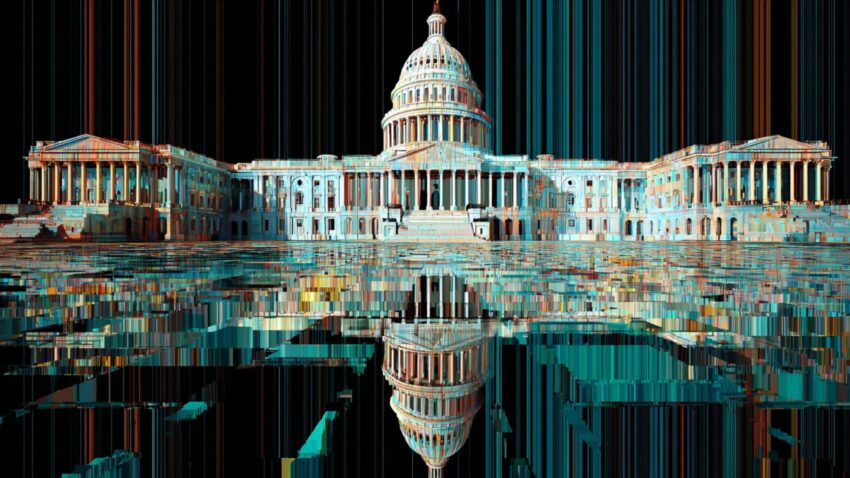If you’re tired of censorship and dystopian threats against civil liberties, subscribe to Reclaim The Net.
Lawmakers in Washington are once again attempting to give the United States a legal pathway to block websites, a power the federal government has never officially held on a broad scale.
The latest push comes in the form of the Block Bad Electronic Art and Recording Distributors Act, better known as “Block BEARD,” introduced in the Senate by Thom Tillis, Chris Coons, Marsha Blackburn, and Adam Schiff.
We obtained a copy of the bill for you here.
On its face, the bill targets foreign websites accused of piracy. But the mechanism it creates would establish something far more significant: a formal, court-approved process that could be used to make entire websites vanish from the American internet.
Under the proposal, copyright owners could go to federal court to have a site labeled a “foreign digital piracy site.” If successful, the court could then order US service providers to block access to that site.
The reach is broad. The term “service provider” here mirrors the broad definition in the DMCA, potentially covering everything from ISPs and search engines to social media platforms, and perhaps even VPNs.
Proponents say this is about protecting the entertainment industry. In reality, it’s about setting a precedent. Once the government has a tool to block certain sites, history shows the definition of “unacceptable” content can expand. Piracy today could easily become something else tomorrow.
The ramifications go beyond the music and movie business. If courts can order an ISP to make a site disappear from view, the same logic could eventually apply to other types of content deemed problematic.
And because the bill has no public transparency requirements, the public could be kept entirely in the dark about which sites are blocked, why they’re blocked, or how long the blocks remain in place.
Supporters in the entertainment industry, including the RIAA and Motion Picture Association, are openly cheering the bill, pointing to similar measures overseas they claim have worked without harming free speech.
But the US is not the same as other countries. The First Amendment’s protection of speech and access to information means this kind of censorship tool carries far more constitutional baggage here than it does elsewhere.
What Block BEARD really represents is a milestone. If passed, it would be the first time the US creates a standing legal process for cutting off access to entire websites at the network level.
The DMCA was sold to the public in 1998 as a way to modernize copyright law for the internet age. But from the beginning, it has been controversial, not just because of its reach, but because of how easily it can be weaponized as a tool for censorship.
The most infamous part of the law is the “takedown notice” process under Section 512. In theory, this allows copyright holders to request the removal of infringing material from websites, search results, and hosting platforms. In practice, it’s often used to silence lawful content.
Artists, journalists, independent creators, and political activists have all been hit with DMCA notices for work that clearly falls under fair use, commentary, or criticism.
Sometimes, companies use the DMCA to scrub negative reviews, hide embarrassing information, or push competing material offline. The burden falls on the person targeted to challenge the notice, a process that can be slow, confusing, and intimidating.
Because most online platforms follow a “remove first, ask questions later” approach to avoid liability, even clearly bogus claims can make content vanish instantly. This takedown system can and has been abused by governments, corporations, and individuals to suppress speech they dislike, with little immediate recourse for the target.
The DMCA was supposed to protect creativity, but its design makes it a ready-made censorship lever. It grants private parties the ability to effectively erase content from the internet without a court order, bypassing the normal checks that protect free expression.
That’s why proposals like Block BEARD raise such red flags. If the DMCA already allows individual posts, videos, or search results to be removed at the click of a button, adding a legal process to block entire websites is the next logical, and far more dangerous, step. It moves the conversation from “this link is gone” to “this whole site no longer exists for US users.”
The DMCA has already shown how copyright enforcement can be twisted into a censorship tool. Giving the government and rights holders a formal way to block entire sites risks creating a far broader, far harder-to-challenge system of online suppression. Once in place, history suggests it will be used for far more than just piracy.
If you’re tired of censorship and dystopian threats against civil liberties, subscribe to Reclaim The Net.
The post This Hollywood-Backed Bill Would Give Government Power To Block Websites appeared first on Reclaim The Net.
Click this link for the original source of this article.
Author: Dan Frieth
This content is courtesy of, and owned and copyrighted by, https://reclaimthenet.org and its author. This content is made available by use of the public RSS feed offered by the host site and is used for educational purposes only. If you are the author or represent the host site and would like this content removed now and in the future, please contact USSANews.com using the email address in the Contact page found in the website menu.





